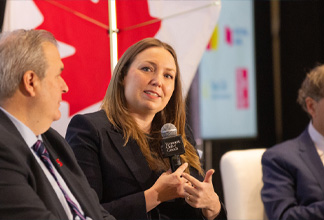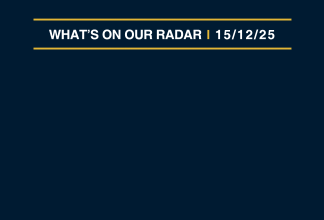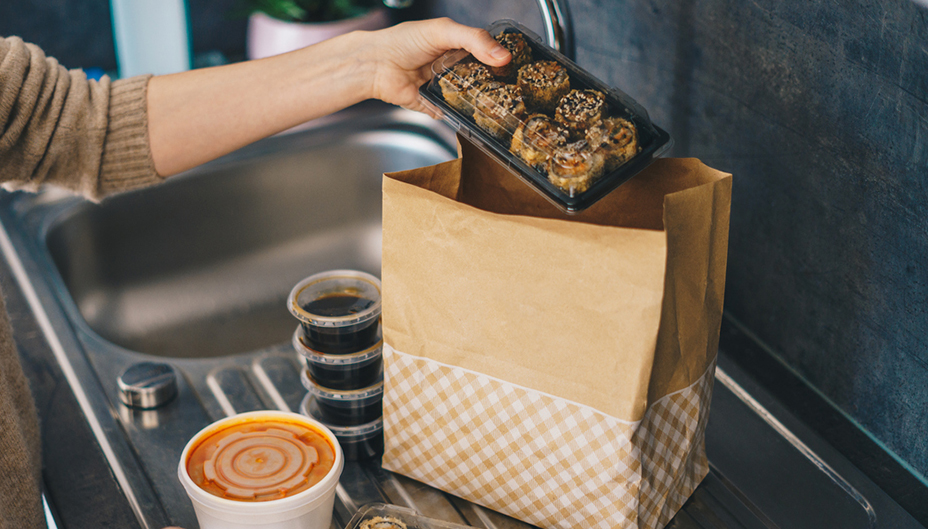Consumer Spending: Where Is Canadian Cash Going?
Written by The Content Team
Published on July 3, 2020
minute read
Share:
During the current disruption, everything feels out of whack, and that includes how we spend our money. Costs that seemed objectively fixed pre-COVID have suddenly loosened, while our spending in other areas has increased. (We see the steady procession of packages arriving at your door!)
What are Canadians spending their money on right now and where are they saving? To find out, we asked our colleagues and consulted RBC Economics' COVID Consumer Tracker, a series of reports summarizing anonymized cardholder data from recent months.
After a major slowdown in March, consumer spending volumes are nearly back to normal as of mid-June, says the latest report. "But with some pandemic-fighting restrictions still in effect, spending on traditional early-summer pastimes wasn't possible." Here's where that money is – and isn't – going.
Dining
One area that's seen significant change is the way Canadians eat. Grocery spending spiked when the pandemic began in March, though it slowed in June. "Feeding people three meals a day, instead of only worrying about dinner, has significantly increased our grocery bill," says our manager of strategic initiatives." My kids snack 24/7 – those yogurt drinks add up fast!"
What does this co-worker do when he simply didn't plan his grocery shop properly? "We order in once or twice a week." Though the data shows spending on take-out and delivery is seeing a minor increase more recently after plummeting in March, it's still behind year-ago levels. In June, Canadians also tentatively began to venture out to restaurants, according to an earlier consumer tracker report. "Restaurant and dining spending climbed as restaurants opened at lower capacity in parts of Canada. Spending was down a third from last year, but far off lockdown lows (-68 per cent)."
Cars and Commuting
Our colleagues have seen great cost savings from cutting the commute. "Public transit is not a nickel or dime that's for sure," says an operations team member. "Without having to drive into work I save a ton on parking, $200 on gas, plus wear and tear on the car," says another co-worker. The cardholder data echoes these sentiments, showing steep declines starting in March. According to the most recent report, "Transit and parking expenditures were still two-thirds lower than last year, though limited parking enforcement in many cities and free transit in others may have reduced spending."
Car expenditures seem to be recovering since dropping at the onset of the pandemic. "Card spending on gas and automotive services had nearly recovered to year-ago levels in mid-June, as Canadians ventured out after the lengthy lockdown," says the latest report. As our associate content producer said of the week she took off at the start of June: "We just took day trips to hike and sightsee."
Home Improvement
People continue to spend on home upgrades. In May, the cardholder data showed significant spending at DIY construction stores, as well as on appliances and furniture. "I've invested in new doors for all the rooms and closets upstairs, replaced almost all the ceiling light fixtures and did some painting," says the strategic initiatives manager. "It's not a huge cost, especially for the impact it's had on the overall look of the house." But, he says, without COVID, he likely wouldn't have made these changes for a few more years. "I'm spending more on furniture, mostly because I moved during this craziness," adds an operations colleague.
Apparel
Among the things she's paused spending on, one colleague says she's buying fewer unnecessary shoes. "Or," she corrects, "they are necessary, but I've spent the last three months in socks." Cardholder data shows a slightly different story: "Canadians jumped at the opportunity to try on clothes in-store when retailers began to reopen at the end of May," says the most recent report. "By mid-June, spending had stabilized, but was still down about 25 per cent from a year earlier." Having risen 80 percent in May (relative to 2019), online shopping continues to give bricks-and-mortar retail a run for its money. In fact, some signs show that online spending is becoming entrenched, says the latest report.
Entertainment and Other Discretionary Items
One co-worker has kept his out-of-school son busy with a few new buys, including a computer, bicycle and games – plus a couple of items to improve his own golf game. Another colleague says, "We took the kids to the drive-through zoo." But, while golf and gaming have dominated entertainment spending, "the continued closure of galleries, casinos, and events for 10-plus people weighed on other entertainment categories," says the latest report.
Other things our co-workers have purchased in recent months include everything from newspaper subscriptions to cat toys. "We got a new cat during the disruption, so we've seen some expenses there," says our compliance manager, who also purchased a few things to keep his two young daughters busy, including an inflatable pool. (But he notes the savings in daycare costs have been "huge.") Our senior content producer, meanwhile, got a head start on charitable donations, which she typically leaves to end of year. "I've been finding causes that need support now," she says, "so have been making donations earlier than I normally would." And, appropriately, "We also added another newspaper subscription to our roster to keep up on the rapidly changing state of this world," she says.
What's Next?
The cardholder data doesn't speak to future spending, but our colleagues offer some ideas: "I'm going back to buying my daily coffee," says one operations team member, who is also looking forward to a return to the gym. Another big area of projected spending is travel. "Maybe down the road – a long road – I'll book a nice beach vacation," says another co-worker.
Until globetrotting feels relevant again, remember: skipping the daily latte does not make you a millionaire (as some members of the social media community have recently discovered and lamented). That is to say, paying careful attention to where your money is going is always a good idea. Our strategic initiatives manager says taking a look at his current spending has encouraged some thought: "I will be looking at more areas to potentially save, like better planning of groceries."
RBC Direct Investing Inc. and Royal Bank of Canada are separate corporate entities which are affiliated. RBC Direct Investing Inc. is a wholly owned subsidiary of Royal Bank of Canada and is a Member of the Investment Industry Regulatory Organization of Canada and the Canadian Investor Protection Fund. Royal Bank of Canada and certain of its issuers are related to RBC Direct Investing Inc. RBC Direct Investing Inc. does not provide investment advice or recommendations regarding the purchase or sale of any securities. Investors are responsible for their own investment decisions. RBC Direct Investing is a business name used by RBC Direct Investing Inc. ® / ™ Trademark(s) of Royal Bank of Canada. RBC and Royal Bank are registered trademarks of Royal Bank of Canada. Used under licence. © Royal Bank of Canada 2020.
The views and opinions expressed in this publication are for your general interest and do not necessarily reflect the views and opinions of RBC Direct Investing. Furthermore, the products, services and securities referred to in this publication are only available in Canada and other jurisdictions where they may be legally offered for sale. If you are not currently resident of Canada, you should not access the information available on the RBC Direct Investing website.
Explore More

7 Ways to Get Ahead Financially in 2026
How you might invigorate your finances and put your money to work more intentionally this year
minute read

Economic Outlook: Uncertainty is Here to Stay, So What's Next?
Takeaways from the Economic Club of Canada’s Annual Event
minute read

3 things: Week of December 15
What the Inspired Investor team is watching this week
minute read
Inspired Investor brings you personal stories, timely information and expert insights to empower your investment decisions. Visit About Us to find out more.







